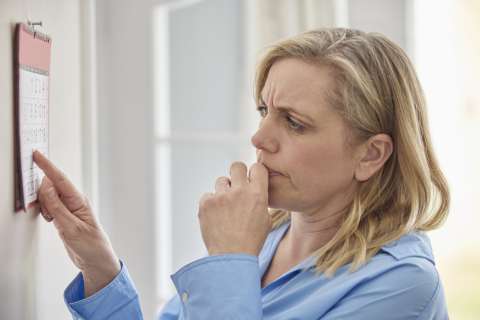Some women welcome menopause with a sense of relief at no longer having to deal with periods and birth control. Others dread “the change” as the beginning of a slow slide into old age. But whether you’re ready to embrace it or fear it, the question remains — can you control when it occurs?
The average age of menopause is around age 51 for most women. You are considered menopausal when you’ve gone a full year without having a menstrual period. At menopause, your ovaries stop releasing eggs and your body’s production of hormones — most notably, estrogen — sees a steep decline. These hormonal shifts can influence many aspects of your health, for better and for worse.
Entering menopause later in life may have some health benefits. Currently, there is no medication you can use to purposely delay when menopause occurs. But there is some evidence that your lifestyle may impact menopause timing.
Health risks of early menopause
Going through menopause early (which typically means around age 45 or younger) can have some important impacts on your health. Estrogen is thought to have protective qualities that can help keep your bones, heart and brain healthy.
When your ovaries are no longer flooding your body with estrogen during each monthly cycle, some natural aging processes speed up:
- Bone loss: Lower estrogen levels can speed up the rate at which you lose bone density. That can leave you at a higher risk of osteoporosis.
- Heart disease: Estrogen protects the heart by helping keep blood vessels healthy and cholesterol levels in balance. Without that protective hormone, you may start to experience plaque buildup in the arteries, increasing your risk of heart attack or stroke.
- Memory issues: Lower estrogen and other changes at midlife can affect how your brain functions — including how well it processes and remembers information.
- Sexual dysfunction: A drop in estrogen can affect your libido. It can also lead to reduced lubrication and less enjoyable sex.
- Urinary incontinence: A lack of estrogen can weaken the urethra, making incontinence (leaking urine) more common.
Health benefits of later menopause
Women who go through late menopause (typically defined as age 55 or older) reap the protective benefits of estrogen for longer. That can lead to stronger bones and a healthier heart even after menopause. The other effects of lower estrogen — in terms of memory, sex drive and bladder control — will still strike. You just get a few more years before they do.
While later menopause may be healthier overall thanks to the protective effects of estrogen, there are some downsides: More years of exposure to estrogen can increase your risk of breast, endometrial and ovarian cancers.
What can hormone replacement therapy do?
Hormone replacement therapy (HRT) is intended to help ease menopause symptoms. Taking hormones will not delay menopause. HRT is often recommended for women experiencing severe hot flashes, sleep issues, vaginal dryness and for those at high risk of osteoporosis.
HRT involves taking either estrogen or estrogen plus progesterone. Some older research connected HRT with increased risk of breast cancer and heart disease, but current evidence suggests it can be used safely. Hormone therapy is especially effective — and safest — when used at lower doses and for shorter amounts of time.
How your lifestyle can help delay menopause
The age at which you go through menopause is not entirely within your control. Genetics play a big role in determining when your body experiences this shift. In fact, some say the age at which your mother reached menopause is one of the best predictors of when you’ll go through it.
That said, your lifestyle choices may also impact the timing of menopause. While there’s no guarantee that healthy lifestyle habits will delay menopause, it’s possible they will have some effect.
Some factors that might help delay menopause include:
- Breastfeeding your baby: Some research has suggested a link between breastfeeding for 7 to 12 months and lower risk of early menopause.
- Getting regular exercise: Physical activity can impact hormonal balance. Exercising several days a week may help you better manage the menopausal transition.
- Not smoking: Research has shown that women who smoke are more likely to go through menopause early than women who don’t smoke.
- Eating a healthy diet: There is some evidence that a diet that’s rich in antioxidants and omega-3 fats may delay menopause. One theory is that those nutrients may protect the eggs in the ovaries and help preserve them for longer.
These strategies may or may not push off the start of menopause. But staying as healthy as possible is important at any age — before, during and after menopause.



